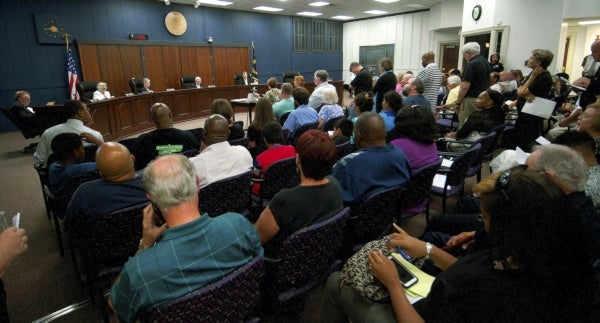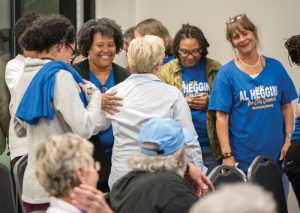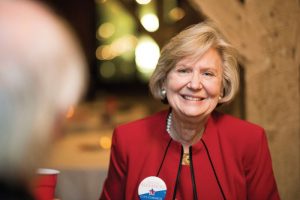Josh Bergeron: For Heggins, Alexander, first mayoral terms brought unique trials
Published 12:00 am Sunday, November 10, 2019

- People line up in 2015 to speak at a public comment period. (Jon Lakey/Salisbury Post)
For the third time since 2011, an incumbent mayor has found herself finishing in second place or worse in a bid for re-election to the Salisbury City Council.
The latest example came Tuesday, when election night results showed Mayor Al Heggins finishing 186 votes shy of first place. She was preceded by Karen Alexander, who finished third in 2017 after a tumultuous first term. Alexander found herself back in first on Tuesday. If tradition holds, she’ll be mayor again starting in December.
Both women were preceded by Susan Kluttz, who found herself second to Paul Woodson in 2011 by a razor-thin margin, 35 votes. Alexander was short of first by a few hundred votes in 2017, and Heggins on Tuesday was unable to keep it as close as Kluttz.
As the face of Salisbury for many years, the question for Kluttz was, “What went so well for Woodson?” With larger margins of defeat, the question facing Alexander and Heggins is, “What went wrong?”
Heggins rose to prominence in conjunction with community concern about crime and the fatal police shooting of Ferguson Lauren during the service of a “no-knock” warrant in November 2016. The warrant was served after a three-month investigation, and Rowan County District Attorney Brandy Cook said the officer who shot Laurent did not violate any criminal laws.
Heggins connected with like-minded people and made friends in an activist movement that resulted from Laurent’s death, including the group Women for Community Justice.

SALISBURY POST FILE PHOTO – In November 2016, the Salisbury-Rowan NAACP held a news conference asking for more answers in the fatal shooting of Ferguson Laurent. Pastor Dr. Nilous Avery is speaking with (L to R) Rev. D.M. Mason, Rev. Tim Bates, then-NAACP President Scott Teamer, Rev. Patrick Jones, Al Heggins, the late Latasha Wilks and Isaac Heggins.
She was a key player in that movement, which grieved for Laurent and called for action, too. She was part of a group that called on the city to suspend the use of no-knock warrants and gave speeches during public-comment periods at City Council meetings.
Heggins organized a series of Stop the Violence summits, too, which she spoke about at the June 6, 2017, council meeting.
“I ask you, City Council, to be the brokers of peace. When your community calls, go to them,” Heggins said. “I don’t know of any healthy relationship in which one side dictates the rules of engagement. It must be done together.”
It might be underselling her involvement to simply say she was a key player. In many ways, she was the face and most prominent voice of the movement.
Meanwhile, Alexander, who first joined the council in 2013 by appointment after Kluttz joined former Gov. Pat McCrory’s administration, was dealing with a tumultuous time in Salisbury as mayor. Crime was a particularly poignant concern for the council and Salisbury residents. Some public comments during meetings ranged from not-so-polite to insulting. And the city still hadn’t figured out what to do about Fibrant’s burdensome debt.

Salisbury Mayor Karen Alexander talks to Police Chief Jerry Stokes following a planning retreat in March 2017.
Meanwhile, Kenny Hardin was serving on the council and his straightforward, no-frills personality led to clashes with Alexander and other city officials. Hardin wrote in an opinion column in the Post that he is unapologetically black and that was not the same as being radical. But Hardin knew he was rubbing people the wrong way. His words at one point led to the city’s liability insurance company hiring an attorney to investigate an unspecified complaint by an employee.
“I know that politics is ugly, but this is beyond comprehension,” Alexander said after one meeting turned into a public spectacle.
As the calendar turned to July, it was time for candidate filing to begin. Maggie Blackwell decided not to run for re-election, but she was the only incumbent not doing so. Incumbents were joined by a crew of others hoping to seize the opportunity created by Blackwell’s decision. Heggins didn’t wait to file, doing so on the first day possible.
Despite a tumultuous two years, Alexander was the presumptive favorite to be mayor again, but the rest of the story is well-known. Heggins mounted a strong first campaign for the council — so strong that she squeaked out a first-place finish, with David Post in second. Hardin didn’t make the cut.
Heggins became the city’s first black woman mayor. Her victory further energized the broad coalition she built from the West Square to the West End and put folks in the city’s political conversations who had previously been on the sidelines.

2017 Salisbury City Council election top vote-getter Al Heggins (center) was all smiles after arriving at the Board of Elections on election night. Jon C. Lakey/Salisbury Post
Unanimous votes were the council’s biggest accomplishment during her tenure, Heggins says. As an example, she cites the Resolution of Reconciliation, which condemned lynchings in 1906 and started a process of racial reconciliation.
Through actions like the resolution and scheduling a town hall meeting about the Confederate monument “Fame,” Heggins strengthened support within her base. She found opposition and anger among those uncomfortable with her progressive agenda.
One voter, Alice Edwards, told Post reporter Liz Moomey on Tuesday that “Fame” was a key election issue for her. Edwards said she voted for candidates who “didn’t want to erase the city’s history.”
Right, wrong or indifferent and while Heggins never officially vocalized her position about moving “Fame,” the issue negatively affected her among some voters. An unanswered question is whether people like Edwards would have voted for Heggins if “Fame” had not become an issue during her tenure.
Like Alexander, Heggins faced criticism in the community, too, but it usually didn’t find its way to the City Council’s public-comment periods. There were few public spectacles during meetings but plenty of awkward moments. Heggins got off to a rough start and never seemed to click with her council counterparts.
Heggins spoke out about state, national and international issues, posting some of those statements on the city’s website. A statement in February from Heggins condemning raids by U.S. Immigration and Customs Enforcement was an example of that. It drew criticism from fellow council members who had already grown frustrated that they weren’t more informed about the mayor’s plans and actions.
Look no further than Alexander’s not-so-subtle statement after Tuesday’s election for proof of that.
“I want the council to feel that they are equally informed and communicated with,” Alexander told the Post.

JON C. LAKEY/SALISBURY POST Karen Alexander was the top vote-getter for the Salisbury City council in 2019.
Now, Salisbury finds itself in an interim period: In a few weeks, the current council members will be sworn in for another term and pick a mayor — the last mayor selected by the council rather than Salisbury voters.
Then, it’s time to get to work. That all incumbents are returning indicates voters are happy with the direction of city government. Crime rates are decreasing, and the economy is still improving.
If tradition follows, Alexander will be mayor. That job requires being an effective leader of a diverse council. Heggins, meanwhile, would be mayor pro tem. And she must work to keep her coalition engaged in city government because it includes people with historically underrepresented perspectives.
Most important, the council must form a good, professional relationship and move Salisbury forward.
Josh Bergeron is editor of the Salisbury Post. Email him at josh.bergeron@salisburypost.com.

